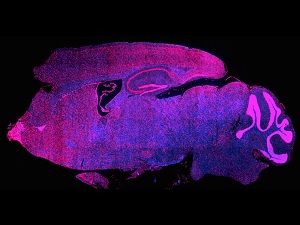 |
| Cross-section of a mouse brain, Brd4-producing cells are stained red but appear purple against a blue stain that labels all cells.--Courtesy of Rockefeller U. |
Targeting cancer through BET inhibition has inspired a slate of biopharma R&D programs and deals from the likes of Merck ($MRK). But using the original BET inhibitor that helped spark the new work, a team of investigators at The Rockefeller University say that they were able to track a troubling side effect, with the treatment scrambling neurons in mice in a way that spurs memory loss.
The researchers used a generally available compound called Jq1 which inhibits a BET protein called Brd4. This particular compound has the ability to jump the blood-brain barrier. Added to mouse neurons, the scientists found that when they stimulated a process necessary for memory creation--transcribing genes into proteins--the BET inhibitor damped down the activity considerably.
"After administering a Brd4 inhibitor, we no longer saw those changes in transcription after stimuli," says first author Erica Korb, a postdoctoral fellow. And following up with a memory test designed for mice, the treated mice showed signs of memory loss compared to a group of rodents unaffected by a placebo.
The promise of BET inhibition spurred Merck to buy OncoEthix late last year in a $375 million deal, netting an early-stage program dubbed OTX015. OncoEthix boasted that OTX015 was the first drug in its class to demonstrate the potential of blocking MYC, which regulates the transcription of growth-promoting genes and cell cycle regulators. The approach has shown promise for acute myeloid leukemia, Burkitt's lymphoma, and multiple myeloma. Soon after OncoEthix in-licensed its program Constellation Pharmaceuticals partnered with the Leukemia and Lymphoma Society on a BET inhibitor for blood, bone marrow or lymph-node-related cancers. And at least at one point GlaxoSmithKline ($GSK) had its own program for the Brd4 inhibitor GSK525762A, though they recently downsized their oncology pipeline significantly in an asset deal with Novartis ($NVS).
This is an animal study, so it's important to keep in mind that animal studies are far from conclusive. In addition, the team at Rockefeller notes that this first-gen BET inhibitor has been succeeded by new drugs that are designed differently, which may make them far less likely to penetrate into the brain. And other drugs can be also be reengineered to avoid any threat of potential neurological damage.
There could also be an upside to this. Damping down neuronal activity could be a plus when dealing with overstimulation related to epilepsy. And the researchers plan to follow up on that as well.
- here's the release